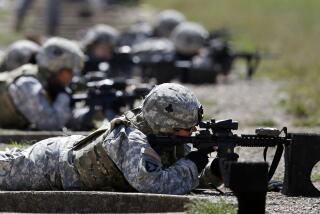GIs Told to Rein In ‘Rambo’ Tendencies : Training: In battle, bravado and rage may lead to war crimes, Army experts caution. Briefings emphasize keeping cool in the heat of combat.
- Share via
WITH U.S. FORCES, Saudi Arabia — As the Army heads toward battle, its experts in the laws of war have warned soldiers to brace themselves for the quiet moment after combat when a burst of fury can stir an urge to exact revenge.
“You have to prepare yourself to expect the surge of adrenaline on contact,” said Lt. Col. John Altenburg, a Vietnam veteran and expert in battlefield behavior, now serving as the staff judge advocate for the 1st Armored Division here.
“There’s a second surge of adrenaline once the fight is over,” he said. “You’re still alive, and you’re mad--and that’s when the potential for war crime occurs.”
In the eternal struggle to ensure that war remains controlled violence, the top division lawyer and his staff have sought in briefings to emphasize self-restraint. To reinforce this, their lesson on “transition to war” is a primer on the web of laws governing battlefield conduct.
“We’re trying to make it as pragmatic as possible to make it beneficial to the guys who are pulling the trigger,” Altenburg said. In teaching troops about the Geneva Conventions and other laws of land warfare, the lawyers say they try to give the soldiers a thorough moral grounding.
But, the 46-year-old Ohioan said: “Some guys, 18, 19 years old--they don’t buy all that philosophy stuff. So our final point to them is it’s against the UCMJ,” the Uniform Code of Military Justice, which basically governs every step of a person in service.
The lawyers’ counsel comes atop warnings from military commanders about the importance of soldiers’ retaining control.
“Don’t talk Rambo stuff!” Maj. Gen. Ronald H. Griffith, the division commander here, told soldiers a few days ago, in a stern admonition against the mano a mano bravado that commanders believe can undermine discipline in battle.
Other orders prohibit what had threatened to become a desert fashion trend: the wearing of head scarves, knotted at the back. They are prized by soldiers for their dust-protective qualities but disparaged by higher-ups as “Rambo rags.”
To ensure that, even in the heat of combat, the war is fought according to law, military lawyers have been positioned in crucial Army operations centers. They will review the rules of engagement, limiting particular weapons systems to particular targets. (Details of the rules may not be reported, under military orders.)
And, even in an operation clearly aimed at the destruction of the Iraqi army, commanders still prefer to speak of war, using the verb “to process”--an indication of the fine-tuned calibration they intend, even in a ground battle.
In such an operation, American forces would probably seek to exploit advantages, permitting some weapons systems to strike at Iraqi forces, while keeping soldiers at a safe distance from Iraq’s most destructive tanks, officers say. With firm control, they stress, the United States can minimize the horror of all-out armored battle.
“The name of the game is that we’re not going to be drawn into a war of attrition with him,” Griffith told his troops later, in what became an outdoor pep talk. “You’re not going to go head-to-head with him or try to look him down and exchange shots with him for any period of time.”
Already, in preparing soldiers for the inevitable personal encounters in which experts believe discipline is most vulnerable, commanders here have taken extra steps to preserve a sense of order on the battlefield.
In one such drill last week, Staff Sgt. Jeffrey Allen of the 4th Battalion, 7th Regiment, acted his part by pointing a rifle at an advancing group of what were supposed to be Iraqi prisoners of war--and simultaneously shouting instructions in Arabic from a hand-assembled phrase book he kept in a trench beside him.
“We’re committed to making this work,” said Altenburg, the division judge advocate. “I’m confident the guys are going to do the right thing.”
The briefings, wrapped in a flurry of recent small-group sessions, took on what one staff lawyer, Capt. Kent Duncan, called “a greater sense of urgency” as combat appeared to draw near. Soldiers assigned guard duty, he said, are particularly eager to know when they are within their rights to shoot.
But it is times of even greater stress at which lawyers aim their quick tutorial.
Altenburg, a former English teacher drafted into combat in Vietnam, says he tries to draw from his own experience.
“A lot of people have never heard about that second surge of adrenaline before,” the former infantryman and Special Forces officer said. “It gets real quiet as we tell them that.”
The lawyers’ warning--and the admonition to respect the laws of war--continues: “You will be angry. You will see fallen comrades. You will want to seek revenge.
“You’ve got to control yourself so you can control your soldiers.”
This report was reviewed by military censors.
More to Read
Sign up for Essential California
The most important California stories and recommendations in your inbox every morning.
You may occasionally receive promotional content from the Los Angeles Times.










